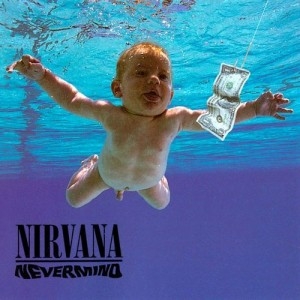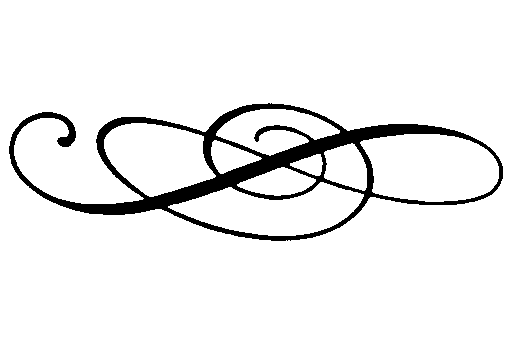

 Nirvana
Nirvana
| Release date | Label | Producer | Genre | Length | More info |
| 1991.09.24 | DGC | Butch Vig | Grunge | 49:09 |  
 |
A Field Guide to Self-Hatred, from Negative Creep Publishers.
Background
I am not a huge connaisseur of the early underground precursors of grunge - I know there's Dinosaur Jr., and Squirrel Bait, and, of course, all the funny guys like the Pixies who somehow ended up influencing all the depressed grunge guys, but I guess the facts still speak for themselves: however inventive, talented, or sincere all these guys were, it was still Nirvana, and no other band, that really captured and embodied the Zeitgeist of the early 1990s. And a large part of that, perhaps, was the fact that people were sick of the Eighties and their grotesque fascination for futurism and hedonism. The hairstyles, the fireworks, the plasticity, the ever-increasing disconnection from reality - that bubble, like the disco bubble of the late 1970s, had to burst sooner or later, and the Nineties' generation had to find a key figure, or figures, to latch on to for the bursting. The fact is, when you come to think of it, in the late Eighties there was pretty much no honest-to-God rock music left for kids with demands: almost everything was either adult contemporary or glammy bubblegum, while "college rock" was largely represented by the likes of R.E.M., so who would you turn to if you wanted genuine kickass energy to rattle your world? Hardcore punkers? Slayer? It was either that or Def Leppard - an odd choice that wasn't really meant to be: somebody had to come up and fill that empty space that used to be occupied by The Stones and The Who in the Sixties, or The Clash in the Seventies. And that somebody should be filling it like he really meant to.
In a way, you could argue that "grunge" was nothing more than pop hooks with heavy guitars, so, not too different from power-pop and arena-rock heroes of the 1970s. But let's not forget the "unhappy" and "angry" bits either - throw in the minor keys and the recklessness of punk, and you got yourself a hybrid that, in the still young and innocent days of 1991, seemed fresh, exciting, and awesomely depressive. At the time, nobody knew that the formula, simple as it was, would soon become the dominant one in "alternative rock" and spawn hundreds, if not thousands of faceless clones, all of them trying to kindle some tiny fire or other out of their petty troubles and pettier talents. But the world did need a hangover from the endless party that was the Eighties, come to its senses and realize that, you know, misery and suffering were still out there, and desperately needed their own spokesmen across the nation and/or the world, rather than just a few whiners obscuring their sorrows with incomprehensible metaphors in dirty club basements. And not even an album like Bleach - Nirvana's excellent debut, which many fans continue to revere as their finest hour - could quite do the trick, because in order to do the trick, to appeal to a mass audience and break the spell, something even more simple and immediately accessible was needed, something that did not have so many songs about "Floyd the Barber" (who the fuck is he, anyway?) or "Mr. Moustache", or, you know, any of those tunes whose names sound like they could have been done by the Pixies. Gut level accessibility, coupled with complete brutal honesty and musical talent - that is what we had to talk about, and that was precisely the achieved goal of Nevermind.
Some basic factsThe rest of the story is legendary - how DGC only expected to sell a quarter million copies at most, how demand soared skyhigh after ʻSmells Like Teen Spiritʼ began its MTV rotation, how the album on the whole "sold out the underground" and how major labels, in the wake of its success, began their club hunts for dirty smelly guitar bangers, how the big singles were overplayed to the extent that people began suffocating, how the backlash hit hard, how Cobain's suicide quenched the backlash for a while, and how, nowadays, people still tend to be divided between the "greatest album of all time" and the "most overrated, boring, stultifyingly simplistic album of all time" camps. Still, even if one is stuck firmly in the second camp, you have to admit that for an album with such a starkly negative worldview as Nevermind, thirty million sold copies is nothing to sneer at - it's not frickin' Thriller, that's for sure, as far as albums that pique public interest are concerned.
For anybody who is seriously interested in the story of Nevermind, I heartily recommend the 4-CD 20th anniversary edition. In addition to all the essential bonus tracks such as B-sides and outtakes, it contains: (a) all eight songs from the "Smart Sessions", held in April 1990 at Smart Studios in Wisconsin before they got the deal with DGC, and featuring, indeed, a much rawer sound than the final product - an essential collector's item; (b) the early 1991 "Boombox Rehearsals", largely a waste of tape because of the predictably awful recording quality, but still curious from a historical standpoint; (c) a complete alternate mix of the album by Butch Vig, that is, presumably, the early mixes that were produced before they brought in Wallace (again, some fans swear by these as much more of "the real thing", but I honestly cannot hear that much difference); (d) a complete recording of a live show at The Paramount Theatre that featured 7 out of 12 tracks on the album and is also quite useful for comparison between their studio and live sound at the time. An essential purchase for the fan, but, of course, if you are already convinced that Nevermind is one of the biggest music industry frauds in history, then no alternate mixes or live performances will be able to sway you from that path.
For the
defense
You know... few things in music creep me out as much as the opening riff to ʻCome As You Areʼ. I am perfectly willing to recognize, like many other people do, that it owes a lot to the very similar riff of Killing Joke's ʻEightiesʼ, but there is one major difference in perception: Killing Joke's melody is not creeping me out. Killing Joke wrote a song about struggle and survival in the Eighties, with an uncertain outcome where you could either win or lose. Kurt Cobain wrote a song about a situation in which the outcome was quite clear. It is not an angry punk anthem. It is a song written by somebody who is already emotionally dead, and to whom physical death is the least of the problems that could overshadow his future being. Obviously, this is a biased assessment - forever colored by what happened in 1994, and since I'd never really paid attention to the song prior to 1994, I have no idea how people felt about it. But the fact remains: the opening riff, with its "underwater" treatment, introduces the steady steps of our old friend Mr. Doom, and then there's that voice. Yes, lots of grunge and alt-rock guys after that had a similar tone - you know, the "spent-ten-years-of-my-life-in-the-trenches" kind of tone - yet there's something truly special about the Cobain tone. When he's not screaming, he's actually much scarier: it's the voice of a revenant, of a death row prisoner who knows that pardon is not an option. If you can't feel the living pain in that "come... as you are... as you were... as I want you to be", the desperation locked in that wobbly, tense, strung out voice... well, I might envy you, because happy (but stupid) is he who does not recognize true suffering. And then, as the volume increases and the level of panick goes up, up, up, with every new proclamation of "I don't have a gun" you get a better and better understanding that he does have a gun, and he might not even be afraid to use it - otherwise, why shout about it so repetitively and with so much increasing desperation? I mean, people have come up with all sorts of silly interpretations of the song as a "peaceful" or even "beautiful" tune where he tries to come to terms with his problems and stuff, but were there, like, any psychiatrists among these people? Because if you ask me, any qualified psychiatrist, upon hearing this song, would have to say: "I'm sorry, guys, but this man needs real help, quick." Instead, people just sent this anthem of death up the charts (not too high, though - even thick-skulled kids must have intuitively sensed something was not quite right).
No other song on Nevermind, in my opinion, comes close to the terrifying sickness of ʻCome As You Areʼ, but there is not a weak moment on the first side of the album anyway. Of course, it is quite formulaic, and the formula has long since become one of the most proverbial and abused formulas in rock music: quiet verse, louder bridge, ultra-loud, heavy, screaming chorus, a guitar solo that usually just mimicks the vocal melody, rinse and repeat, with but occasional variations on the structure. But, first of all, it's not like Cobain really invented this formula (merely borrowed it wholesale from the heavy rockers of yore), and, second, what's wrong with it if it works? So many people never forget to mention the Black Sabbath connection in Nirvana's music, but they forget to mention that Kurt, like Tony Iommi, had a great ear for telling a meaningful simplistic heavy riff from a pointless simplistic heavy riff. Say, something like ʻIn Bloomʼ: the genius is in how, at first, we have this gloomy descending pattern ("sell... the kids... for food..."), where the guitar, the bass, and the vocal can all sound like a grumpy old guy muttering dissatisfaction in a corner. Then, a couple bars later, the same sequence is retained, but the vocals are rising, not falling - the grumpy old guy is getting restless and impatient, just itching for all hell to break loose. In the chorus, the riffage is not so interesting, but the poppy vocal melody is, as is the degree of sneering disgust with which Kurt dissects the "average music Joe" who "likes our pretty songs" and "likes to shoot his gun", but "he don't know what it means" (actually, that bit is ambivalent: he doesn't know what our pretty songs mean or he doesn't know what it means to shoot your gun? you could take it either way, and I'd think that the second way is actually even deeper).
In comparison with the absolute reverence I have always had for these two songs, I have felt more ambiguous about ʻSmells Like Teen Spiritʼ. Next to most other Nirvana songs, this one is neither as creepily psychopathic nor as venomously antisocial as Kurt could be - on the surface, it is just another "frustrated teen" anthem, one that the kids in 1991 could apply to their needs easiest of all, appropriating its wildness but also taking it somewhat out of context. "I feel stupid / And contagious / Here we are now / Entertain us" - this basically translates to the good old "cruel society made us the idiots that we are, and now we're angry and we don't know what we want and it's all your fault" mantra, and I am not sure this was Cobain's precise message, even if he would certainly be sympathetic to it; but that would have made him a punk, and he was not a punk. Perhaps the worst thing about this song is its title, which immediately, all by itself, made Kurt look like a spokesman for his generation, but is there even one other song on Nevermind where he would come even remotely close to that function? Not one, really. It's all about himself, Kurt Cobain, and his problems, with which you might want to identify yourself (especially if you're on serious drugs and have plans to blow your brains out in three years' time), or which you might want to prefer to watch with trepidation from afar. So why should ʻSmells Like Teen Spiritʼ be any different, just because it features the words "teen spirit" and uses the pronoun "we" a couple of times? It's just one more of the man's turns, with awesome funk-metal headbanging potential. And I am really hard pressed to come up with an equally powerful song with the raging "I hate myself (and my generation)" message from any of the three preceding decades - I do think Kurt hit a nerve here that was never before hit with such brutal aggression. The key is that it's internalized rage, not externalized: the stimulus is not to break chairs or lash out at cops, but rather to just tear your own heart out, because you really have no idea of who is truly guilty of this crisis.
Yes, all the songs are about hatred, contempt, and lack of exit, but at least on the first side of the album the band explores and nails all possible shades of black, which, surprisingly, makes the record far more diverse than it sounds the first time around. From the general, oh-so-blunt "I feel stupid and I hate myself" message of ʻTeen Spiritʼ to the "I hate all them idiots and poseurs" message of ʻIn Bloomʼ to the "Goodbye, cruel world, your glimpses of kindness are not enough" message of ʻCome As You Areʼ , and then on to ʻBreedʼ, the fastest song on the album where Dave Grohl gets to really shine on his World War III drumkit, and Kurt manages to turn one of the most simplistic rhythm patterns ever (which, I believe, can be traced back to a surf-pop origin or something; similarity has been noted with ʻPotential Suicideʼ by The Wipers, but the Wipers' song was far more psychedelic in nature) into a 300-meter Olympic dash for an amphetamine-powered Godzilla (I remember being almost floored by that sound upon first hearing it - no idea how something that simple could have been made into such a mindblowing sonic tornado by three guys in 1991; I'd honestly take the power of ʻBreedʼ over any speed metal or thrash metal track ever recorded). The positioning of the song right next to ʻCome As You Areʼ is another chilly sequence: it's like the former is the premonition of demonic possession, a Gethsemane-like prayer before the shit hits the fan and it's all about "I don't care, I don't care, I don't care... I don't mind, I don't mind, I don't mind... don't have a mind!" There's a girl in there somewhere, too ("she said she said"), but she's just as much of an irritating nuisance for existence as everything else. This here is just a murderous, all-out psychotic attack - call it "black rock'n'roll", if you wish, as the "black" in "black metal" - and yet, it is still internalized, and the protagonist is still largely yelling at himself rather than anybody else.
Then there's ʻLithiumʼ, which is almost like a bit of repentance over the psychotic breakdown of ʻBreedʼ. It's all about one's struggle with insanity - culminating in yet another delusional mantra, repeated over and over again, and, just as the endless repetition of "I don't have a gun" eventually makes you understand that the gun is right there, so does the endless "I'm not gonna crack" chant. In these days, here and now, it is easy to be pissed off at the proto-Nickelback-ish yeaaaaahing, but, again, do not make the mistake of confusing the formal copy for the substantial original: Cobain's screaming here is on that primal level, bringing back memories of John Lennon/Plastic Ono Band, except where John used his for therapy (and who cares if the therapy worked or not?), Kurt uses his for temporary relief, knowing full well that there's no cure and that, in fact, he has already cracked, he's merely being here in the same "denial" phase of which he first talked in ʻTeen Spiritʼ. Gruesome. And then the perfect cool-off for Side A: ʻPollyʼ, a brief, quiet ballad on a sensually romantic subject (allegedly inspired by an ordinary story of abduction, torture, and rape) that was actually written much earlier and had almost made it onto Bleach, but apparently Kurt thought that mood-wise, it would fit in better here - whatever, Kurt, it's your own sick choice.
In any case, the entire first side of the album, to me, is nearly flawless in construction and execution. And the more I listen to the album - and the older I get in the process - the more I am struck by how true it all rings; in other words, I am well past the "Nevermind is so overrated" phase of conscience, usually brought on by too much exposure to Pearl Jam and Stone Temple Pilots (not to mention Puddle Of Mudd!), simply because I do believe, arrogantly and haughtily, that I can recognize genuine suffering when I see it, and because the man had the talent to put all that suffering into the simplest, most visceral musical form and get away with it. The difference between these songs and Nirvana's greatest competitor on the grunge scene, Alice In Chains, was that Alice In Chains (despite having a frontman who, in many ways, was very similar to Kurt) were a more complex musical outfit, with firmer roots in heavy metal: Dirt, probably the second best thing grunge has ever come up with after Nevermind, is just as terrifying, but it has a certain "artsy" layer to it - on Nevermind, there's virtually nothing between you and this guy who's already condemned himself to death and feels no need to run circles around that decision. In technical terms, Alice In Chains were more "metal-grunge", Nirvana were more "punk-grunge", and there should be a time for both in your life - just don't take either as a role model.
For the prosecution
As you might have noticed, I have not said a single thing about the second part of the album, and for a damn good reason: for years, despite patiently listening to Nevermind at regular intervals, I would wake up on the morning of the next day and remember nothing about the last six songs. Nothing. As perfectly as I remembered every single melody from the first six tunes, the other six were always a blur. (And the first six an oasis... oh, never mind).Even now, I'm looking back on the track listing and going, " ʻTerritorial Pissingsʼ? What was that all about?". Then I put them on replay, and the songs are OK, but they never have the comparable effect of the first six. I do suppose that this is largely because they sound like second-rate copies - after all, there's only so much you can do with that formula, and eventually you reach a stage where you can no longer guarantee the high quality of your riffs or vocal hooks (ʻDrain Youʼ). On ʻLounge Actʼ, the chorus reminds me of Sting, as if Cobain was doing a mockery of a Police cover - not really a good style for him. ʻStay Awayʼ basically sounds like ʻBreed Vol. 2ʼ, and on any other album, it would have been a highlight, but here it's simply dwarfed by its much superior companion on Side A. ʻOn A Plainʼ is nice and catchy, but... plain: should I feel guilty for not being wowed over by the repetitive pop chorus of "I'm on a plain, I can't complain", the biggest virtue of which, so it seems, is in finding an original way to rhyme the word "plain"? Only ʻSomething In The Wayʼ, a morose ballad that finishes Side B on the same note as ʻPollyʼ, corrects the situation by giving the record a calm, subdued, and still shivery finale, with a lead cello melody by guest musician Kirk Canning that produces a soothing effect on your rattled nerves.
I can imagine a parallel world where people, sick and tired of radio overplay (which mostly concentrates on Side A), would eventually greet the last six songs as being more fresh or even more deep, but there's a reason why the big singles were overplayed - they're simply better. Even if the order in which the material was written and recorded probably does not match the running order of the songs, it still feels as if the first ones were those on which Cobain really "drained" himself, and for the rest of the album was left with generally more pedestrian tricks. That said, this is one of the cases where I don't really mind: if I need to, I can take this as a six-song EP with a few bonuses thrown in (by the way, it is sometimes hard for me to distinguish between side B and the actual bonuses, like ʻEven In His Youthʼ or ʻAneurysmʼ). Because on the whole, yes, I could find myself agreeing with the anti-grunge movement about how limited and limiting the formula is, especially when you're a bunch of amateur musicians with very limited chops - but none of that applies to ʻIn Bloomʼ or ʻCome As You Areʼ, songs that transcend the limitations of the grunge formula by having bleeding chunks of the artist's soul thrown into the production grinder. It does apply to the situation where the artist is being tired and out of fresh feelings, and at their worst, Nirvana were no better than any average grunge hack - the difference being that, unlike the average grunge hack, they also had their best, and that's where you gotta beware.
Conclusion
| Melody | Voice | Mood | Production | Innovation/Influence | Where it belongs | RYM preference | |
 |
 |
 |
 |
 |
 |
#34 (Aug 21, 2016) |

| Previous entry | Main page | Next entry |